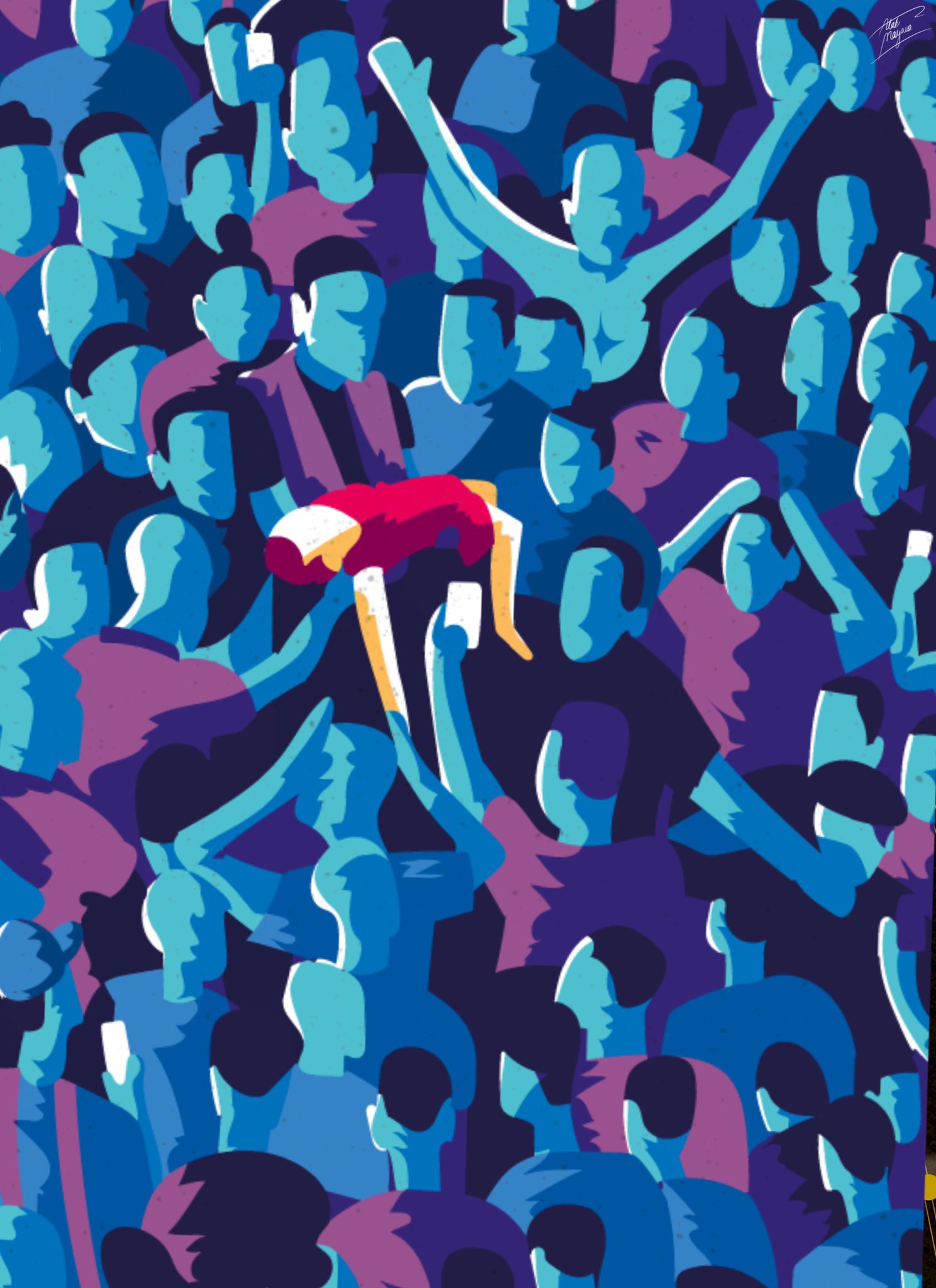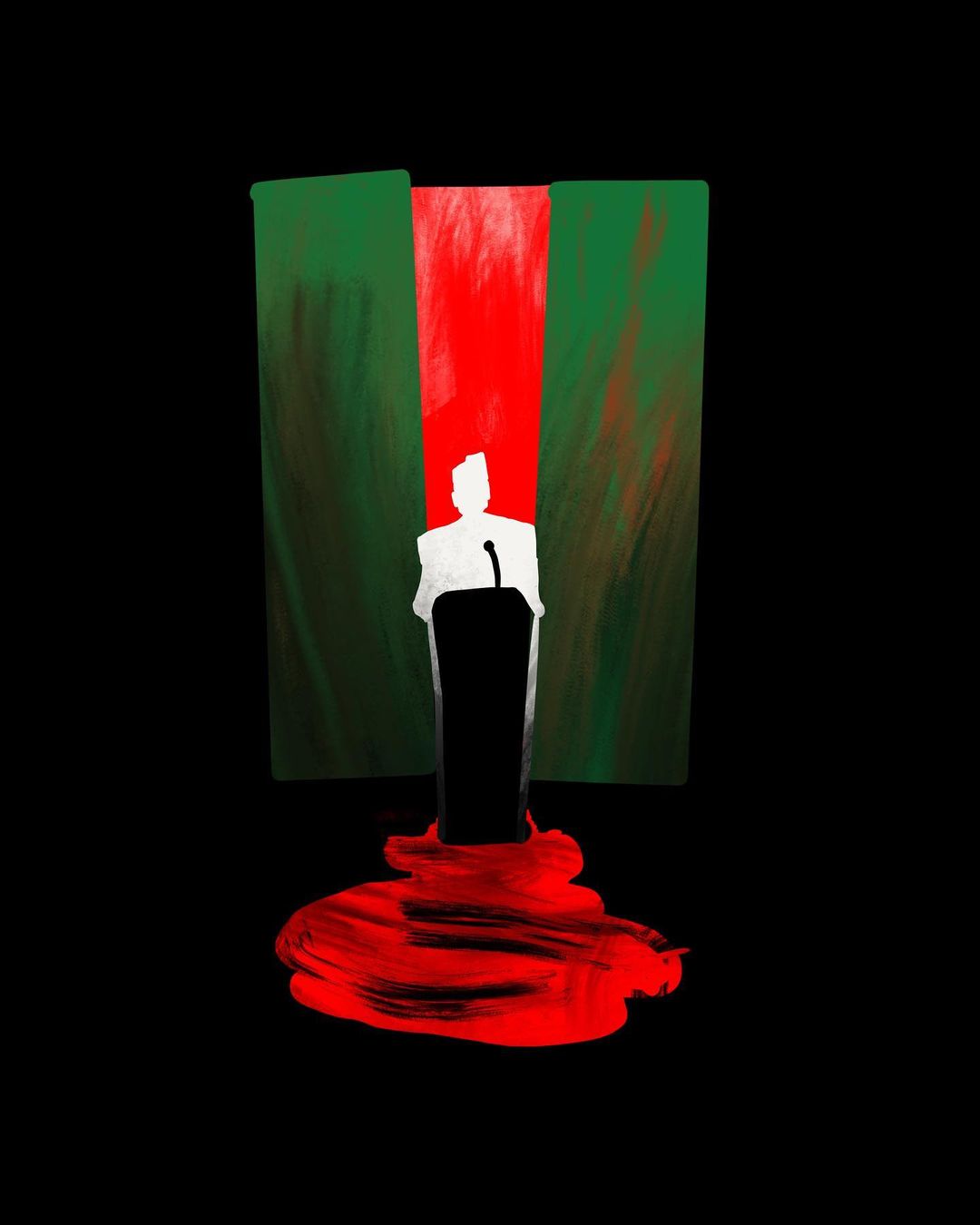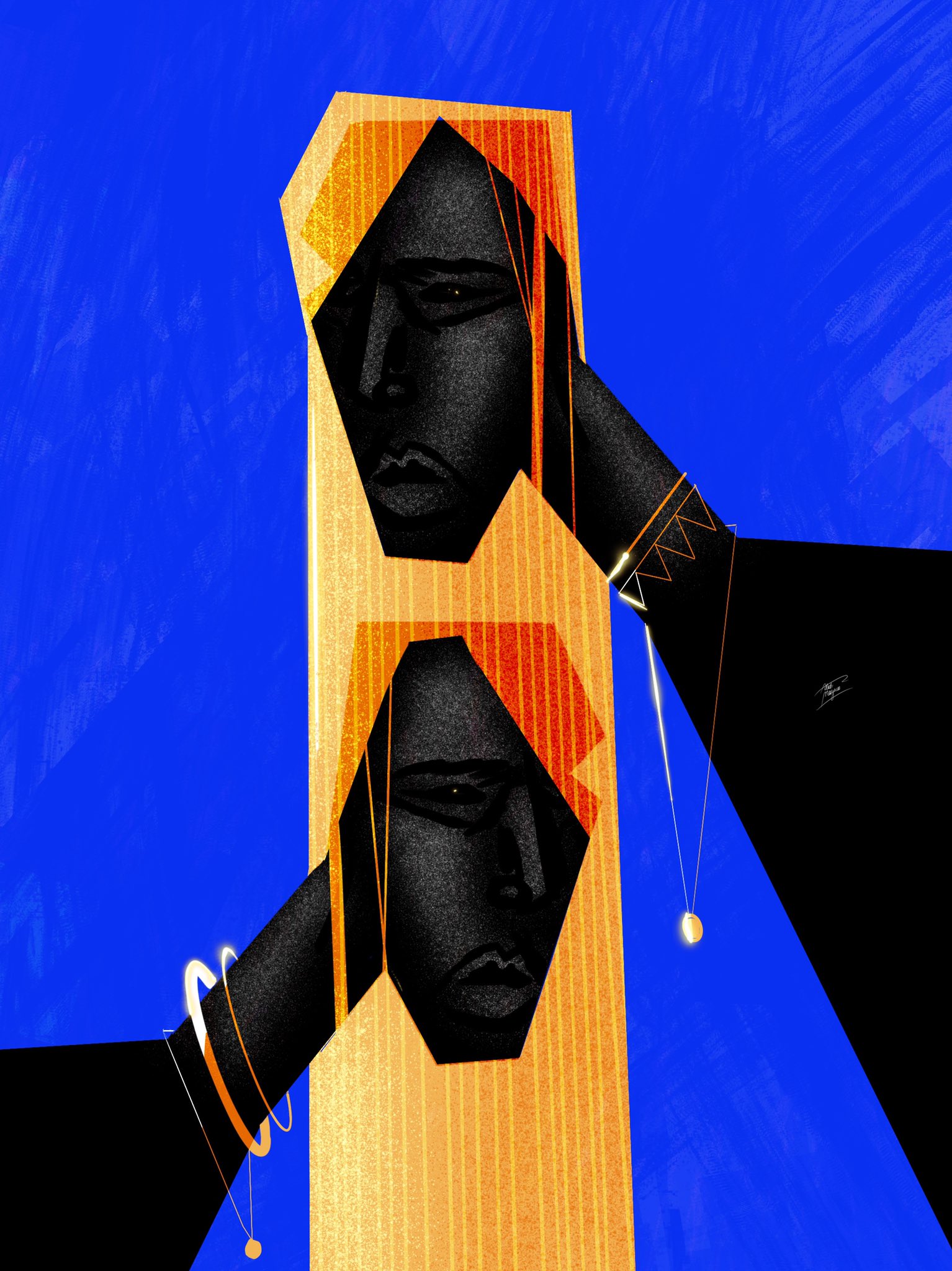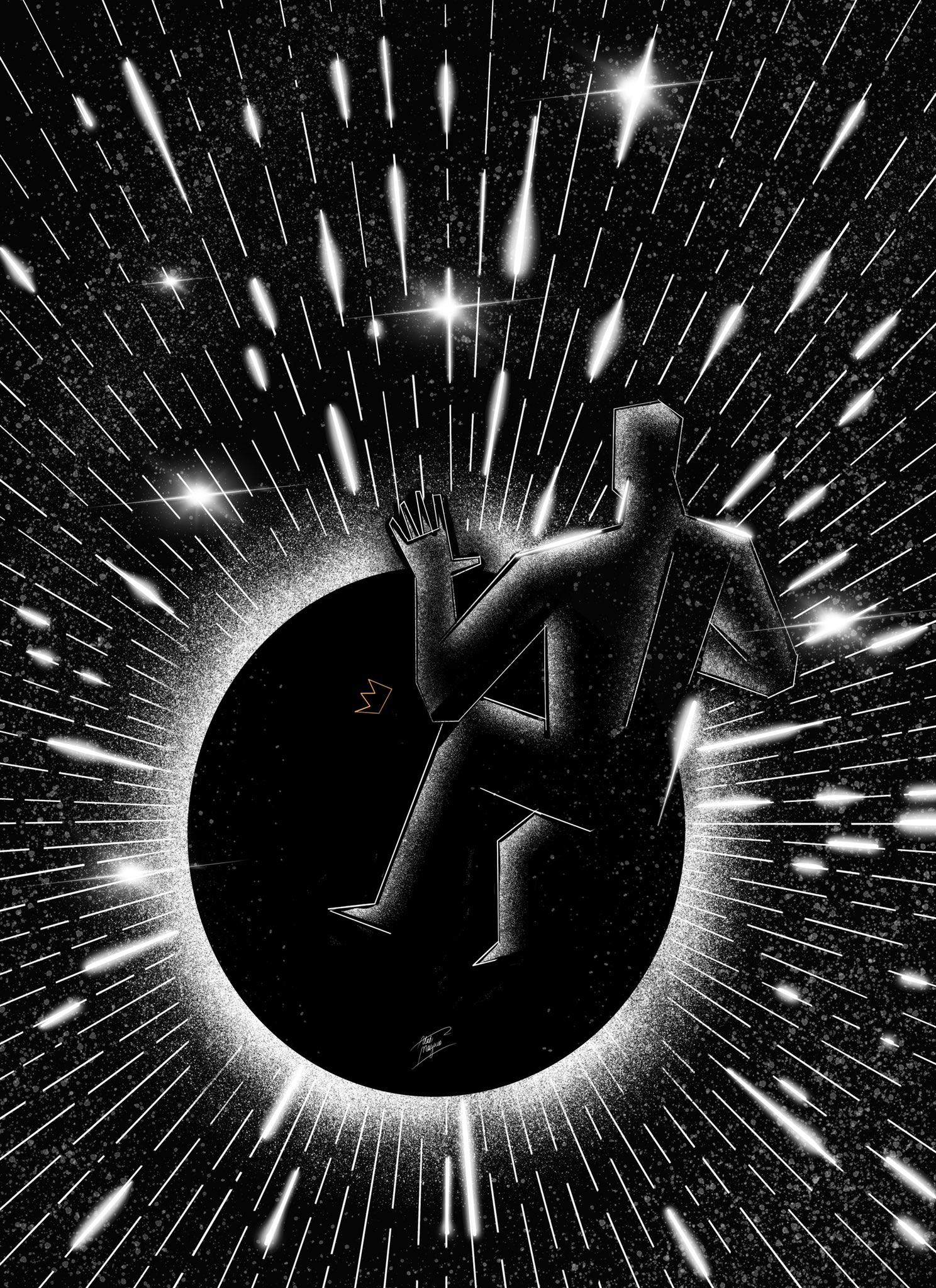Sheyi Owolabi goes in conversation with Mayowa Alabi. Mayowa Alabi Damilola is a Digital Illustrator and Designer. He has been a part of the various design and art projects for many exceptional companies over these years, notably, illustrations for Co-Creation Hub Nigeria and a charity auction organised on Twitter for victims of Otodo Gbame with Just Empower based in Lagos, Nigeria. He was the winner of the European Union/United Nations Women Gender Equality Picture It Comic & Cartoon Competition in 2017.
Sheyi Owolabi: How did you get into art? What was your journey like?
Mayowa Alabi: Beginning, beginning, beginning? The time I picked up serious interest in it, for sure, was when I was a kid. My parents used to drop me off at the neighbor’s house when they went out and he (neighbor) used to draw. I’ve told this story a million times (laughs). So usually when kids start learning how to draw, we usually start with the stick figures to draw on straight lines. I don’t remember particularly being interested in art because of that. But what sparked my interest was my neighbor. We would watch movies, watch all these old movies on VHS tapes of Rambo, Terminator, Commando etc. After the movies, this guy would draw what we just saw. He drew his characters from the side-view. They had hair, flesh and all that. So that’s where I picked it up and that’s what I would do every day. I’d just draw figures after watching movies. That’s what I did even after I moved out of the house. So, all through primary and secondary school, people knew me as the guy that draws even in University. I don’t think I’ve ever gone three days without drawing something at least.
I’ve always been drawing over the years. From drawing like that guy to copying other artists and just improving. And it’s like a part of me at this point.
Sheyi Owolabi: Speaking about how you’ve improved and grown from your early beginnings to now, I’ve observed your work for a while and I think it’s a bit challenging to be able to say, this is Mayowa’s style. How would you describe your style? Do you even have a style?
Mayowa Alabi: Like I tell so many people, my style is “anywhere belle face”. I’ve tried to use a particular style, and every other one then. I just focus on one style for maybe a week or two, and then one spirit just enters me, and I switch it up the next time. I don’t try to contain myself or control the narrative of how I express myself. I just let whatever leads me to do whatever. If it comes out great, fine. If it doesn’t, that’s ok. I’m just going to draw how comfortable I feel. I think I’m comfortable with people seeing stuff and not recognizing it. It’s my work. And I want people to feel different things. ‘Cause human beings are not static. We are dynamic in every way and I think just limiting myself to one style for the rest of my career, is just going to be very limited. I mean, to be fulfilling I know some of them will be great. Some of them might not be great, but then again, for the kind of person I am, because I like to do so many different things.
So, it’s only right that I have different styles because even now I struggle with a loose term to define myself. So, it always kind of creeps me out when people refer to me as one thing. Like, a graphic designer or a photographer or a visual artist, even though I am a visual artist now, I just put that thing because it’s my day-to-day role. So, it’s like I struggle. I don’t like people boxing me to one thing and even the word “creative”, it’s not something I’m comfortable with. I don’t like that label.
Cause I feel like the things I do and want to do are going to go beyond the scope of what people think a creative is meant to be. I know that if people put that label on me once, it’s going to be hard for them to rip it off and people will forever put me in that box. If I ever do anything in future people would go like, Visual Artist turned let’s say DJ or Visual Artist turned music producer. And I don’t want that. I want Alabi Mayowa is doing this, and he’s doing that.
Sheyi Owolabi: A lot of people familiar with you on social media definitely see your work a lot of times. You post new works very frequently. I am going to ask the question they might not be able to ask. How are you doing it? (Laughs)
Mayowa Alabi: So that’s honestly something that I’ve been struggling with. ‘Cause I have been seeing that a lot lately. Every day, people come up when I post something and people are like, this guy is consistent. And I feel like I’m not. I’m the laziest person you’ll ever meet.
What people take as consistency is just me being, honestly, being lazy because like I said, I’ve been drawing for as long as I can remember. So, it’s almost second nature to me at this point. And even though people like to see some of this stuff and they’re like, yeah, this guy is working, it’s just something that I’d do daily.
For as long as I can remember, anytime I’m alone, I’m always in this constant creator mode. I’m always thinking of something I’m going to do or I want to do. I want to draw. So, I am almost never out of ideas and even when I’m out of ideas I do something else.
So, it’s not really hard work. What is hard work for me is drawing for other people. When it comes, that is when people will see that, I’m not exactly a hundred percent consistent even though I try to be. But yeah, doing stuff on a regular basis is just a normal day for me, so to speak.
I don’t think I’m hard working like that. As much as I like to draw every day, I can take breaks. I’ve not drawn today (day of the interview), but I know what I want to draw today.
Sheyi Owolabi: A typical piece that you draw from ideation to drawing, to sharing online. How long does it take on average?
Mayowa Alabi: It depends on what I want to do. Now, it’s very difficult to track myself. ‘Cause usually it would have been easier if I was using just one application. But now thanks to Procreate and Illustrator, I combine so much that it’s hard to time myself. If I’m in a good mood, if I don’t have a backlog of what to do, it’s really easy for me to create say ten illustrations a day, maybe even more. Yeah. It depends on what I want to do.
One thing about me is that even when I used to draw on paper and everything, I have this habit of not completing my illustrations. So, there’s almost always a backlog of old stuff. I can start something off today and leave it to, like, marinate for another day or two and then come back to it and finish it up and people will be like, oh crap! This is very consistent not knowing that you’re seeing work from like a month or two weeks ago. But yeah, again, I’m not consistent.
Sheyi Owolabi: I think I understand even when you were talking about your journey from the beginning, I figured that this “consistency” is a habit for you. Something you’re already used to.
“Starving Artist” is a term used for artists who are quite talented but for different reasons aren’t making money to justify the level of talent. Would you describe yourself as one? Or is art paying you well?
Mayowa Alabi: How do I answer that? I would say no I am not a starving artist. Because so far, I don’t know how, but I’ve managed to brand myself properly in a way that there’s always work, and I have the liberty to turn work down at the moment.
A few months into the year, I announced that I’m closed from taking commissions. I said that because, where I was coming from last year, I did so much work that I felt myself burning out. So, this year, fortunately enough, I was able to get enough deals to cover my bills for the year. So, I’m like, yeah, I’m just going to close out before I die.
It’s not like I don’t want to accept more money or anything, but, I’m just at the point where I’m trying to do work I can be proud of and I can also relax because working consistently is not the life. And I don’t want to do that again. So, no, I’m not a starving artist. I have enough to take care of myself sha.
Sheyi Owolabi: Another thing I want to ask about is, about last year or two years ago, you shared some augmented reality artworks that you did. I believe one of them was a portrait of Jack Dorsey (CEO of Twitter).
What do you think about AR Art, especially in Africa and how did you get into VR?
Mayowa Alabi: How did I get into it? It came from being pushed. It was for a project I had a while ago. It happened when I was at CcHub, my boss then who has been a very big supporter of my stuff called me. He had this idea, he wanted to have an art exhibition. But he wanted it to be different. Something about Art but infused with tech, where people can interact with technology. Off the top of my head, I just thought about QR codes because for the life of me, I couldn’t think of anything else to be done (laughs). Another thing I thought of was having a VR headset and having people see the exhibition digitally. I was just trying ideas. He just kept challenging me.
The timeframe was short. So, I started doing my research. I saw some ideas that were very expensive. Then I saw an AR platform called “ARTIVIVE”. It was easy. And all you needed is to know how to draw and animate and I could do both. So, I could just create an illustration, animate it, upload it to their platform and they’ll bring it to life. All you need is your phone and an application, and the illustration comes to life. I presented the idea to my boss. He liked it. And then the other hard work began. That project took me so long, I was almost in tears because it was my first time. I didn’t have anyone in Nigeria to look up to or anyone I could reach out to basically. So, I was the first to do it. So, it was a bit daunting because if I mess it up, that would be a massive mess up. I have this boss that was already invested so much into it. You can imagine how paranoid I was on the day of the exhibition hoping it’d work out and I was in another country again. Thanks to the almighty God, it worked out fine. Now I can boast and help people who want to go into this space.
Sheyi Owolabi: I guess it’s a case of, there was no road somewhere and you had to create a road yourself. It was rough at first, but now you’re in a space to help other people go through that road easily.
Mayowa Alabi: Yeah. Cause I remember people were on me, like how did he get here? Of course, I got to help others and tell them how to do it.
Sheyi Owolabi: Based on your experience from the exhibition, how viable do you think AR Art can be for Digital artists in Africa?
Mayowa Alabi: It’s a cool art form. But another reason I haven’t been into it since the exhibition is how expensive it is. For the exhibition, the company covered it. So, it was easy for me to experiment and all that. If I want to do any AR stuff now, I have to use my money and it is very expensive to get into. I think it’s at a very early stage now. I think you can upload 2/3 illustrations on the platform (ARTIVIVE) now. But still, it’s not something anyone will be able to get into without proper funding or a significant investment. So, it’s going to take a while to kick off. It’s going to take off when it is more accessible to people. When a boy from UNILAG does not have to stop paying school fees to do AR Art. I think it’s just a bit too expensive at the moment.
Sheyi Owolabi: Still on Art and Technology, what do you think about NFTs especially for artists?
Mayowa Alabi: I think they’re great. It’s another way to kill the middleman and for artists to make more money. I mean, people have some reservations about it like how it’s bad for the environment, which is also valid.
For me, I like to take the Apple approach so to speak when it comes to trying things out or testing stuff. You know how Apple will take like three months or three to five years before they put something on the iPhone. And then when they do it, it feels like the best thing ever. That’s because they took their time, they let the Androids and the Nokias put it out first and make all the mistakes and get all the user feedback from them, and then, they (Apple) do the good work and put it out and everyone feels like it’s the best thing ever.
So I feel like, at this point, it’s like it’s at the testing stage and it’s new and everyone is getting into it and making money of course. But I think we need to give it more time and then, maybe two, three years from now, when it’s better, and all the issues about environmental pollution have been sorted, it’s going to be way, way better and small artists can profit from it.
Sheyi Owolabi: Last year was a very chaotic year because of COVID and it forced everyone to adjust to a new reality and I think a couple of artists I’ve shared their stories about struggling with their mental health because it’s a new reality and something people have never been used to before. How was that period for you?
Mayowa Alabi: Honestly, it was a blessing and a curse because, on one hand, it was the most profitable year for my art and on the other hand, it was so much work. It killed all my hopes and plans for the year. Going into 2020, I had plans laid out. I was going to leave where I was working, and I already had that discussion with management. So, 2020 was for planning things out properly and making sure I leave things in a very good space. I was looking to move to Rwanda. Then COVID happened and nobody could travel again. I had to stay at home and the company started downsizing, I found myself with more work than I had to do before.
So, imagine, I am in a situation where I need to do more personal work to make more money. So that when I leave the company, I’m going to be good. Then, on the other hand, the company is bringing in five times more work than usual. We were a bit understaffed. I did not have any help and I needed to start working hard on both hands.
I needed to start working out for myself and putting myself out there more, then I have to keep working for the company and making sure the company looks good while also making sure there’s no conflict of interest. So it was, it was very, very, very hectic and tiring.
At first, I wasn’t happy that I was at home, but when I started getting into the workflow and knowing exactly how I can work and rest best, then, things started working out. But that wasn’t until August and September. So, it took a while for me to settle down and come up with a plan to work effectively.
I struggled for a bit. You know, the meme where this guy is crying and wiping his tears with his money, that was me basically (laughs).
Sheyi Owolabi: Now, we’ve gotten used to the reality of COVID a part of our lives right now. How are you adjusting to the new normal?
Mayowa Alabi: I love it. Now it’s perfect for me. Cause I’m used to it. I feel like I’ve done most of the hard work I needed to do last year and I’ve positioned myself in such a way that it isn’t, like I said earlier it’s easy for me to turn jobs down now and I can afford to tell people that I’m not going to do this because I don’t like the name of your project or I don’t like the way you smile or something like that (not like I’d tell anybody that). Now, it’s more relaxed. Even though I’m working at a bigger company with much more at stake to deliver, now I have a flow. Now I know exactly what to do and how to also make sure I have a work-life balance at some points.
Sheyi Owolabi: There’s the school of thought that believes most great arts come from a dark or chaotic place. Do you subscribe to that school of thought?
Mayowa Alabi: Well, I can’t speak for everybody. Even in Nigeria, I know a few artists that said they did their best work while they were either heartbroken or going through a mental crisis. It’s a bit tricky for me because regardless of heartbreak or not, mental breakdown or not, I would still draw. It’s like I said, it’s already second nature for me. So, it’s hard for me to say whether my work has been influenced by it or not. It’s not the same for me. Cause I create either way. I can slip into depression or anything but I’m still going to fall back to drawing. I feel like at this point, it’s a coping mechanism for me and it’s something I do to take my mind off things and calm down.
Even if it’s actually work that I get paid to do, it’s still like my escape. It’s still where I can go off and think of something else and not be bothered by what’s happening in the world. Because when I draw, it’s a total escape, especially when I’m really into it. It’s easy to block everything off until I’m done. The problem now is after I finish and there’s nothing to do. So, what I do is, I start working on the next piece because I don’t want to give myself time to think about anything else.
For me, it’s different. But it’s possible for some artists to create great work from a chaotic place.
Sheyi Owolabi: You already have the brand of being a hard worker online. What do you do when you aren’t drawing or working?
Mayowa Alabi: Thanks to COVID and the lockdown, nowadays or for the past year, I just sleep, watch movies and talk to people. I talk to my close friends every now and then.
I try to go out, even though I don’t do it very often. Sometimes I try to go out and watch movies, but I’m seriously preparing to start traveling again. Cause I really, I miss airports and going to new cities and all that. So, I want to add traveling to my way of relaxing. Cause like it’s very fulfilling, like seeing and smelling different environments. I intend to do a little world tour when everything is saner.
Sheyi Owolabi: To round up, what are your top two movies right now that you’ve seen?
Mayowa Alabi: Does that include Movies or series?
Sheyi Owolabi: You can include a series
Mayowa Alabi: So, I have them in my head. DEMON SLAYER (anime). That’s a movie. For a series, I think DEADLY CLASS on Netflix. I really like that. It’s very unorthodox and I like how it’s just different. I like the vibe. It’s different. It’s like high school. American high school drama, but this time they want to kill each other, and there’s a lot of slashing and head swapping (laughs).
Sheyi Owolabi: Thank you for this interview. I appreciate your time.
Mayowa Alabi: My pleasure.










